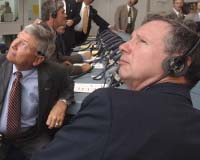
NASA Administrator Michael Griffin (R) and NASA Deputy Associate Administrator Michael Kostelnik (L) view the Space Shuttle Discovery launch from the Launch Control Center at NASA's Kennedy Space Center, Florida, 26 July, 2005. (Photo by Bill Ingalls)
By Jean-Louis Santini - Houston(AFP)
Aug 01, 2005
The head of NASA said Sunday that the US space agency had "goofed" on key safety checks, as engineers examined whether space shuttle Discovery is safe to return to Earth.
A final judgment is not expected until Monday. NASA is still analyzing the reinforced carbon protection for the nose cone and wing leading edges, and studying whether protruding gap fillers on the bottom of the spacecraft pose a significant risk, officials said.
National Aeronautics and Space Administration shuttle flight director Paul Hill said Sunday that astronauts could be asked to fix the two pieces of filler dangling from Discovery's underbelly during a spacewalk.
"We have a team of folks working aggressively at options to go and make that gap filler safe if we decide it's an issue," Hill said from mission control at the Johnson Space Center here.
The fillers are used to keep hot gas from flowing into gaps in the thermal protection in tile-protected areas.
NASA engineers and mission managers, meanwhile, have given Discovery's tiles the all clear following worries that they may have been damaged by a piece of insulating foam which fell off the rocket during liftoff Tuesday.
Since the launch they have been reviewing images of Discovery's body to check for potential damage to avoid a repeat of the Columbia space shuttle tragedy in 2003. The Columbia disaster was blamed on similar debris that hit the shuttle during blastoff.
NASA officials were distraught to see the insulating foam fall off, since they had worked furiously to avoid such a problem.
NASA administrator Michael Griffin said pre-flight safety checks had fallen short.
"Our judgement at the time was that it was okay. As everyone has said without any attempt to hide it ... we goofed on that one," he told NBC television.
Griffin also conceded NASA had been "lucky" that the stray shard of foam that fell off Discovery's external tank during liftoff had not caused serious damage.
"If it had broken off earlier and if it had followed a different trajectory, it could have hit the orbiter... and could have done some damage," he said.
Columbia burned up during re-entry on February 1, 2003, after debris hit its left wing during liftoff, opening up a critical breach in the ceramic tiles that made up its protective heat shield. The seven crew members died.
NASA grounded its shuttle fleet and implemented major safety reforms after the tragedy.
The shuttle fleet was grounded again Wednesday after the foam debris fell off Discovery.
Discovery is currently docked at the International Space Station and the crew continued their mission Sunday, moving supplies and equipment onto the ISS.
Japanese astronaut Soichi Noguchi and American counterpart Steve Robinson meanwhile prepared for their second spacewalk planned for Monday. They will install a 600-pound gyroscope on the ISS.
The pair tested new repair techniques during their first venture into space Saturday.
Discovery will spend an extra day in orbit, NASA announced. The shuttle will now return on Monday, August 8, at 0847 GMT, instead of Sunday.
The extra day in orbit will allow the seven-astronaut crew to get a head start on tasks that could be affected by the suspension of further flights: removal of trash and old equipment from the space station.
Some 11 tonnes of waste have piled up over three years, cramping the space station.
Astronauts will pack it into the Rafaello transport module which rides in Discovery's cargo bay and which had carried 13.5 tonnes of food and equipment for the space station.
First launched in August 1984, the shuttle has completed 30 successful missions in space, more than any other orbiter in the NASA fleet.